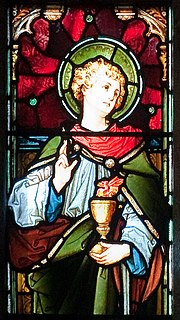A Quote by John the Apostle
In this is love, not that we loved God but that He loved us and sent His Son to be the propitiation for our sins. Beloved, if God so loved us, we also ought to love one another.
Related Quotes
Jesus wanted to show us his heart as the heart that loved so deeply. For this reason we have this commemoration today, especially of God's love. God loved us, he loved us with such great love. I am thinking of what St Ignatius told us.... He pointed out two criteria on love. The first: love is expressed more clearly in actions than in words. The second: there is greater love in giving than in receiving.
Many years ago, our father Ibrahim (AS) made a choice. He loved his son. But He loved God more. The commandment came to sacrifice his son. But it wasn't his son that was slaughtered. It was his attachment to anything that could compete with his love for God. So let us ask ourselves in these beautiful days of sacrifice, which attachments do we need to slaughter?
God’s love sets us free from the need to seek approval. Knowing that we are loved by God, accepted by God, approved by God, and that we are new creations in Christ empowers us to reject self-rejection and embrace a healthy self-love. Being secure in God’s love for us, our love for Him, and our love for ourselves, prepares us to fulfill the second greatest commandment: To love our neighbor as ourselves.
God loved us, and to prove it to us became human in order to become our brother in the flesh. He became poor, the poorest of the poor, in order to be able to include us all as his brothers (and sisters). He became a little child in order to be like children, even born, children from the slums.
God has loved us and has given us all that he is and has. The Father gave the Son, the Son gave his very self, the Holy Spirit became our habitual sanctifier.... How grateful I should be to this kind Savior!
To be loved but not known is comforting but superficial. To be known and not loved is our greatest fear. But to be fully known and truly loved is, well, a lot like being loved by God. It is what we need more than anything. It liberates us from pretense, humbles us out of our self-righteousness, and fortifies us for any difficulty life can throw at us.
Faith is not our saviour. It was not faith that was born at Bethlehem and died on Golgotha for us. It was not faith that loved us, and gave itself for us; that bore our sins in its own body on the tree; that died and rose again for our sins. Faith is one thing, the Saviour is another. Faith is one thing, and the cross is another. Let us not confound them, nor ascribe to a poor, imperfect act of man, that which belongs exclusively to the Son of the Living God.
The gospel is the proclamation of free love; the revelation of the boundless charity of God. Nothing less than this will suit our world; nothing else is so likely to touch the heart, to go down to the lowest depths of depraved humanity, as the assurance that the sinner has been loved -- loved by God, loved with a righteous love, loved with a free love that makes no bargain as to merit, or fitness, or goodness.
There are two gods. The god our teachers teach us about, and the God who teaches us. The god about whom people usually talk, and the God who talks to us. The god we learn to fear, and the God who speaks to us of mercy. The god who is somewhere up on high, and the God who is here in our daily lives. The god who demands punishment, and the God who forgives us our trespasses. The god who threatens us with the torments of Hell, and the God who shows us the true path.
There are two gods. A god who casts us off because of our sins, and a God who calls to us with His love.
God's unfailing love for us is an objective fact affirmed over and over in the Scriptures. It is true whether we believe it or not. Our doubts do not destroy God's love, nor does our faith create it. It originates in the very nature of God, who is love, and it flows to us through our union with His beloved Son.
What each of us longs for the most is to be both fully known and fully loved. Miraculously, God feels the same way about us. God, too, wants to be fully known and fully loved. God wants this so much that He has promised to knock down every obstacle in the way, enduring even His own death, to be with us, to consummate this love.
Anyone who knows he is loved is in turn prompted to love. It is the Lord himself, who loved us first, who asks us to place at the center of our lives love for him and for the people he has loved. It is especially adolescents and young people, who feel within them the pressing call to love, who need to be freed from the widespread prejudice that Christianity, with its commandments and prohibitions, sets too many obstacles in the path of the joy of love and, in particular prevents people from fully enjoying the happiness that men and women find in their love for one another.
We are children, perhaps, at the very moment when we know that it is as children that God loves us - not because we have deserved his love and not in spite of our undeserving; not because we try and not because we recognize the futility of our trying; but simply because he has chosen to love us. We are children because he is our father; and all of our efforts, fruitful and fruitless, to do good, to speak truth, to understand, are the efforts of children who, for all their precocity, are children still in that before we loved him, he loved us, as children, through Jesus Christ our lord.






























